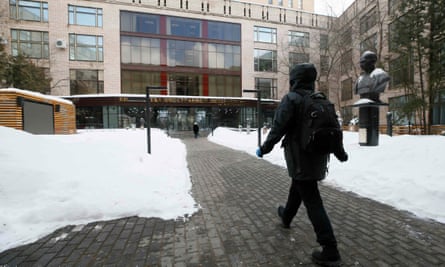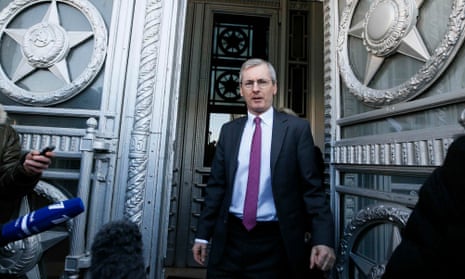Moscow is to expel 23 UK diplomats and shut down the British Council in Russia amid increasing tensions over a nerve agent attack against a former double agent and his daughter on British soil.
The Russian foreign ministry summoned the British ambassador on Saturday to inform him of the retaliatory action taken after the UK’s expulsion of 23 Russian diplomats.
But the Russian Federation has gone a step further and shut down all activities of the British Council, which promotes greater understanding of the UK and the English language. The foreign ministry said it would also close a consulate in St Petersburg.
Speaking at the Conservative party spring forum on Saturday, Theresa May said: “We anticipated a response of this kind and we will consider our next steps in the coming days alongside our allies and partners.”
She said the UK would “never tolerate a threat to the life of British citizens and others on British soil from the Russian government”.

The Foreign and Commonwealth Office (FCO) said the government had anticipated such a response and that the National Security Council would meet early next week to consider Britain’s next steps.
The UK has already said – perhaps as a deterrent to the Russians – that if Moscow escalated the row with its reprisals, the UK had ready a second phase of possible measures in place. No 10 will now have to decide whether to risk a spiral of further punishments.
The most obvious step is to expel the Russian ambassador to Britain who is probably coming to the end of his term, but any such expulsion could lead to Moscow proposing an alternative. Withdrawing the England football team from the World Cup remains off-limits.
A former national security adviser said the priority should be to gather international support for a new approach towards Russia, a process that starts on Monday at a long-scheduled meeting of EU foreign ministers in Brussels.
Lord Ricketts said: “The biggest losers from this closure of the excellent British Council programme are the Russian people. Britain’s most effective steps now are to go after the regime-linked hot money in London and to campaign for the Salisbury attack to be seen as a threat to the international community.”
The British Council said: “We are profoundly disappointed at this development. It is our view that when political or diplomatic relations become difficult, cultural relations and educational opportunities are vital to maintain ongoing dialogue between people and institutions.
“We remain committed to the development of long-term people-to-people links with Russia as we do in over 100 other countries.”
The former British ambassador to Moscow Sir Roderic Lyne counselled against further tit-for-tat diplomatic measures, saying: “It is not sensible to mud-wrestle with a gorilla.”
Tom Tugendhat, the Conservative chair of the foreign affairs select committee, also cautioned against further pure diplomatic measures. He said Vladimir Putin’s greatest vulnerability lay in the exposure of his personal wealth, and suggested making life uncomfortable for the Russian president’s close allies with property in London.
Speaking on BBC Radio 4’s Today programme, Tugendhat said: “We should be absolutely clear – none of the 23 British diplomats being expelled have been involved in the attempted murder of people in Russia. None of them have attempted to use nerve agents in the Russian Federation. None of them have put at risk hundreds and hundreds of Russian citizens to the most horrific death imaginable.
“So this is really absolutely symbolic and typical of a Russian Federation that has used lying and propaganda as a means of warfare and is now repeating its style.”
His committee will have an opportunity to press the foreign secretary, Boris Johnson, to explain what the government is doing to clamp down on the Russian oligarchs in London when Johnson gives evidence to the foreign affairs select committee on Wednesday. A group of Tory MPs are backing Labour’s calls for tougher legal measures.
British diplomats claim a panoply of measures are already in place, but the separation of powers in the UK means it is for the courts to deploy the law, not the government. But they also acknowledge that the scrupulous way the UK courts operate, and standards of evidence required, makes London a magnet for Russians to invest.
The Guardian understands that another measure under consideration is to persuade as many allies as possible not to congratulate Putin on his certain re-election victory on Sunday, as is customary. Officials understand that the measure is purely a token gesture, but will nonetheless send a message of collective disgust at the brazen use of a chemical weapon.
Officials are also believed to be sounding out European partners on whether they would be ready to expel Russian diplomatic staff from their territories too, though it is unclear how successful such overtures have been.
Speaking to reporters outside the Russian foreign ministry, Britain’s ambassador to Moscow, Laurie Bristow, said: “We will always do what is necessary to defend ourselves, our allies and our values against an attack of this sort, which is an attack not only on the United Kingdom, but upon the international rules-based system on which all countries, including Russia, depend for their safety and security.”
Fresh concerns surfaced over the death this week of a London-based Russian businessman, Nikolai Glushkov. Scotland Yard said on Friday that he died from compression to the neck and opened a murder investigation.
Russia also suspects foul play in Glushkov’s death and opened its own inquiry on Friday.
